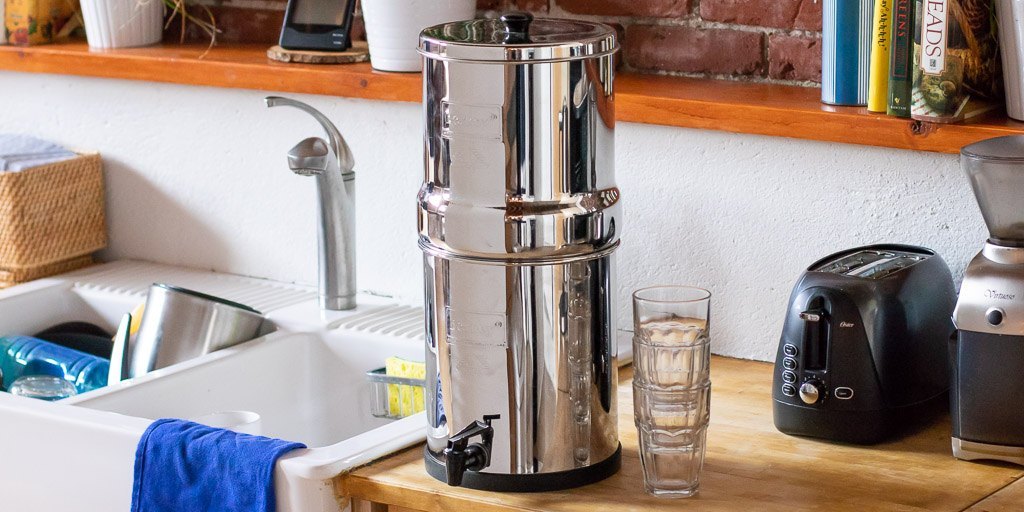Berkey Filter: Here's the Truth

The Berkey Filter
Have you ever heard of the Berkey Filter? Are you curious about the science behind it and how it works? Do you trust the claims made by Berkey?
Chances are, you’ve seen the Berkey filter popup in your Facebook or Instagram feed. This filter unit seems to be gaining in popularity – we wanted to share some information with you on the Berkey.
Read on to learn more about our thoughts on the Berkey.
NOTE: We pulled information from both the main manufacturer website, as well as information from the largest Berkey dealer’s website.
Article at a Glance
If you want the basic ideas of this article boiled down to a few major key points, here you go:
- The Berkey Filter is not NSF-53 certified.
- The Berkey Filter claims to exceed the requirements of NSF-53, this is not true.
- Where NSF-53 would’ve required they run 6,000 gallons of water through the filter and THEN test the water, one of the labs used only ran 2 liters of water through the Berkey before testing.
- Berkey claims it can remove contaminants that it is in no way certified to remove, and the industry does not recognize its filtration method as a valid way to remove many of the contaminants it claims to remove.
- When looking at the contaminants the Berkey Filter claims to remove, if seems too good to be true – it is.
History of the Berkey Filter
Berkey Filters started in the late 1990s in Colorado. New Millennium Concepts, Ltd. (NMCL) is the manufacturer of Berkey. Starting with the Big Berkey, they then expanded their line of products which now over 6 different systems. They are primarily now an online-based company, with a dealer network of other online companies selling them as well.
Certifications
NSF Standard 53 Certified – NO – Berkey has yet to be certified an independent, third-party testing agency such as the NSF. While they claim their tests have shown that they meet and exceed the standards of the NSF, they have yet to be certified. You would think a large water filter company such as Berkey wouldn’t hold back from being validated by a legitimate agency, but they seem to find it less than important – we disagree.
WQA Gold Seal Certified – NO – The Water Quality Association is the standard for water purification equipment certifications. The Berkey filter has yet to be certified with the WQA gold seal.
Water Tests
If you go on the Berkey website, you will find that they claim to have multiple tests done by EPA certified labs and universities:
“The Black Berkey filters have been tested by several EPA-accredited laboratories including the Department of Toxicology and Environmental Science at Louisiana University, Spectrum Labs, and the University of Phoenix. This extensive testing confirmed that the Black Berkey Purification Elements far exceed EPA and ANSI/NSF (Std. 53) protocol.”
They actually don’t show results from any of these departments and laboratories. The only tests they have on their website are from the following:
- ENVIROTEK LABORATORIES – Website
- ANALYTICAL SERVICES – Website
- THE COUNTY OF LOS ANGELES DEPT. OF AGRICULTURE – Website
Interesting note, both Envirotek Laboratories and Analytical Services are both “certified” through The NELAC Institute.
The Filtration Process of the Berkey (According to Berkey)
The Black Berkey Purification Filters are the core of the Berkey filter. The following is an excerpt pulled from their website:
“The element’s filtration media is a combination of micro-pores, which trap harmful contaminants like bacteria, and revolutionary material with adsorption and ion exchange properties that essentially attract molecules and viruses to the media, preventing them from passing into your drinking water.”
Another page goes a little more in-depth on what this means:
- The first line of defense is is that the element is composed of more than 6 different media types, all of which are compacted closely to create paths of very small pores
- These pores are small enough to be declared as “microfiltration” which is an industry-standard for filtration down to (0.1 to 2.0) microns
- The media also claims to use unique adsorption and absorption properties to create an ionic barrier
- The heavy metals in the water are extracted through an ion exchange process, where the molecules are electrically bonded to the media
- And finally, they claim that since it uses gravity to flow through the media, the longer contact time provides better filtration
Claims of the Berkey Filter
What caught my eye about the Berkey filter was how many contaminants it claimed to remove. Not only does it claim to remove a very large list of contaminants, but also it claims to remove many of those contaminants to the 99.99% range.
This list of contaminants include:
- Viruses
- Pathogenic Bacteria
- Trihalomethanes
- Inorganic Minerals
- Heavy Metals
- Micro-Organisms
- Pharmaceuticals
- Pesticides
- Volatile Organic Compounds
That’s a lot of contaminants it claims to remove.
On the Berkey web page explaining the filtration specification, some of the contaminants are claimed to be removed at a Log Reduction 4, 5, 6, and even 9 reductions. Do you know what log 9 reduction means? It means they are claiming the contaminant is being reduced down 99.9999999%.
Another page on their website claims,
“For example, our systems have been tested for the removal of hundreds of contaminants including heavy metals, pesticides, herbicides, pharmaceuticals, pathogenic bacteria, and viruses.”
What we need to look at is the technology and filtration methods that the Berkey uses and what the capabilities are of those filtration methods.
Capabilities of Berkey Filtration Methods
The Berkey Filter is at the core of this – the Black Berkey is what they call the filters.
The composition of the Black Berkey is made of “a carbon composite containing high-grade coconut shell carbon combined with a proprietary blend of 5 other types of media”. This is all the details we get from Berkey. So we can only speculate what those 5 other medias are.
Wire Cutter wrote a pretty interesting article about the Berkey Filter where they ran some tests, including cutting open the Berkey filter, this was their finding:
According to Wire Cutter, the internals seemed to be comprised of carbon and embedded ion exchange resin.
Here are some very interesting clips from the Wire Cutter article:
“None of the tests we cite here—not ours, and not the New Millennium-contracted tests by Envirotek or the Los Angeles County lab—comes near the rigor of NSF/ANSI tests.”
“To be abundantly clear: Neither we nor Envirotek nor LA County reproduced the entire NSF/ANSI Standard 53 protocol, used for gravity-fed filters like the Black Berkey.”
Like us, (Envirotek) prepared his test solutions to NSF/ANSI Standard 53, but did not run the 6,000 gallons of contaminant solution through the filters that the complete Standard 53 protocol would have required of the Black Berkeys. He reported that the filters gave exceptional performance on lead in his test, too, corroborating our own finding. However, he said that they stopped meeting the NSF removal standard after approximately 1,100 gallons of filtering—barely more than a third of the 3,000-gallon lifespan New Millennium claims for the Black Berkey filters.
LA County followed a separate EPA protocol, which involved passing just single, 2-liter samples of the challenge solutions through the filters. Unlike us or Young, the county found that the Black Berkey filters removed chloroform to its test standard, in its case by greater than 99.8 percent to less than 0.5 ug/L from 250 ug/L.
Are you catching this? Berkey claims “The Black Berkey filter element had extensive testing at state- and EPA-accredited laboratories and far exceed EPA and ANSI/NSF (Std. 53) protocol.” while in reality, the tests they are using to justify their “contaminants removed specifications” do not at all exceed NSF 53 protocol.
What Berkey is doing is similar to a car manufacturer saying that their new car gets 95 miles per gallon (mpg). While in the fine print saying that the only tests they took for mpg were while the car was rolling downhill. It is simply untrue.
Log Reduction
Berkey’s site also mentions log reduction. Log reduction is a type of filtration measurement. It’s a measurement of how much of the concentration of a contaminant is reduced.
For example:
- 1-log reduction means that the concentration of the contaminant has been reduced by 90%
- 2-log reduction means that the concentration of the contaminant has been reduced by 99%
- 3-log reduction means that the concentration of the contaminant has been reduced by 99.9%
- 4-log reduction means that the concentration of the contaminant has been reduced by 99.99%
And so on.
The Berkey Filter claims to remove viruses at an amount greater than 5-log reduction (99.999%), while also claiming that it removes pathogenic bacteria at an amount greater than 6-log reduction (99.9999%).
Another page on their website claims pathogenic bacteria at a 9-log reduction (99.99999%).
For a point of reference, pharmaceutical distillers only claim a 4-log reduction (99.99%). And Reverse Osmosis systems, which along with distillation provide the highest purity of water available for residential use, claim a 1-log or 2-log reduction (90%-99%).
(Note: We also install whole-house 4-log reduction systems that remove viruses)
What Berkey Says About Reverse Osmosis
In an article on their site, Berkey is comparing Berkey filters vs Reverse Osmosis.
One of their main attacks is that Reverse Osmosis removes healthy minerals that are good for the body. They claim (and rightly so) that reverse osmosis removes minerals such as Iron, Potassium, Calcium, Cobalt, and Manganese.
Here’s the catch…
On their filtration specifications page, Berkey claims to remove the following contaminants:
Cobalt (>95%); Copper (>99.9%); Iron (>99.9%); Zinc (>99.9%); Manganese (>99.9%)
Check out our article about “does reverse osmosis remove healthy minerals from water” if you want to learn more!
Reverse Osmosis
We are firm believers when it comes to the capabilities and claims of reverse osmosis. The reverse osmosis systems that we sell are CERTIFIED NSF-58, this is the certification for Reverse Osmosis systems; which is even more stringent than standard 53.
When it comes to drinking water purification, reverse osmosis delivers the highest purity of water, with legitimate science to back up its claims. Check out our article about reverse osmosis to learn more about the benefits of reverse osmosis.
In Conclusion
While the idea of purchasing a cheap, simple canister that can remove many contaminants at a high level of reduction sounds very appealing, the science simply does not back up the claims. No filter that uses similar technology to the Berkey is certified or claims to remove the amount that the Berkey filter claims to remove. The Berkey is NOT certified.
Ready to Take Control of Your Water Supply?
Don’t wait for water shortages or unreliable sources to disrupt your life. With our Rainwater Harvesting systems, you can enjoy a sustainable, reliable, and completely self-sufficient water solution tailored to your home’s needs.

